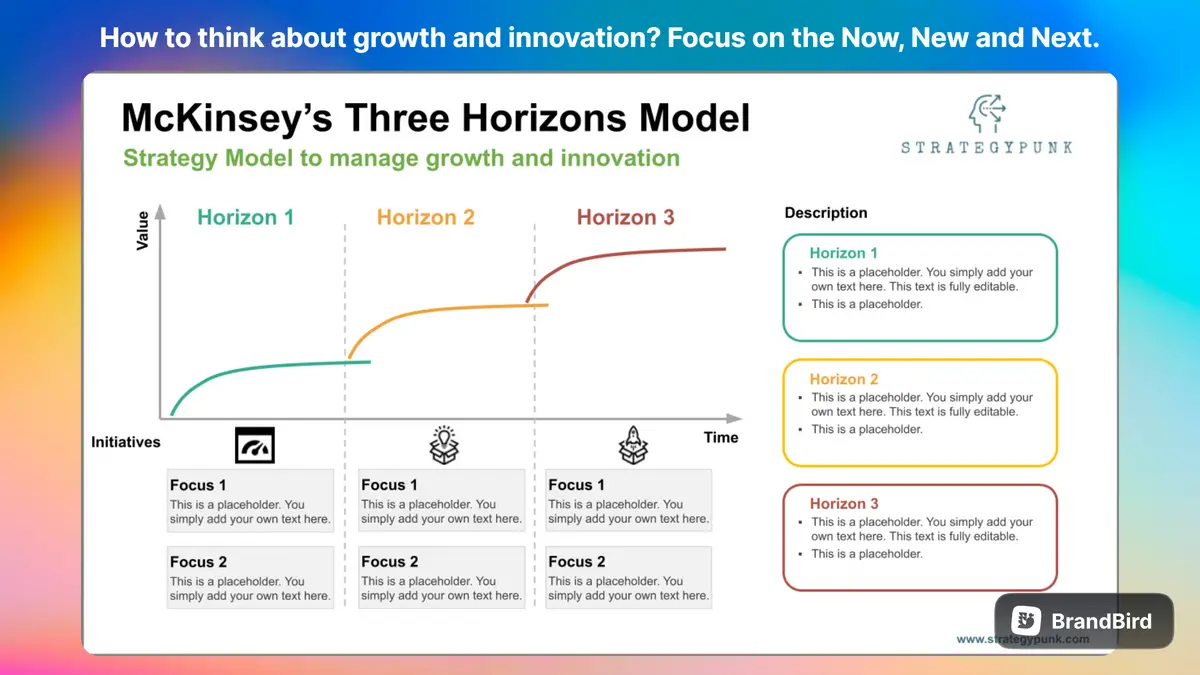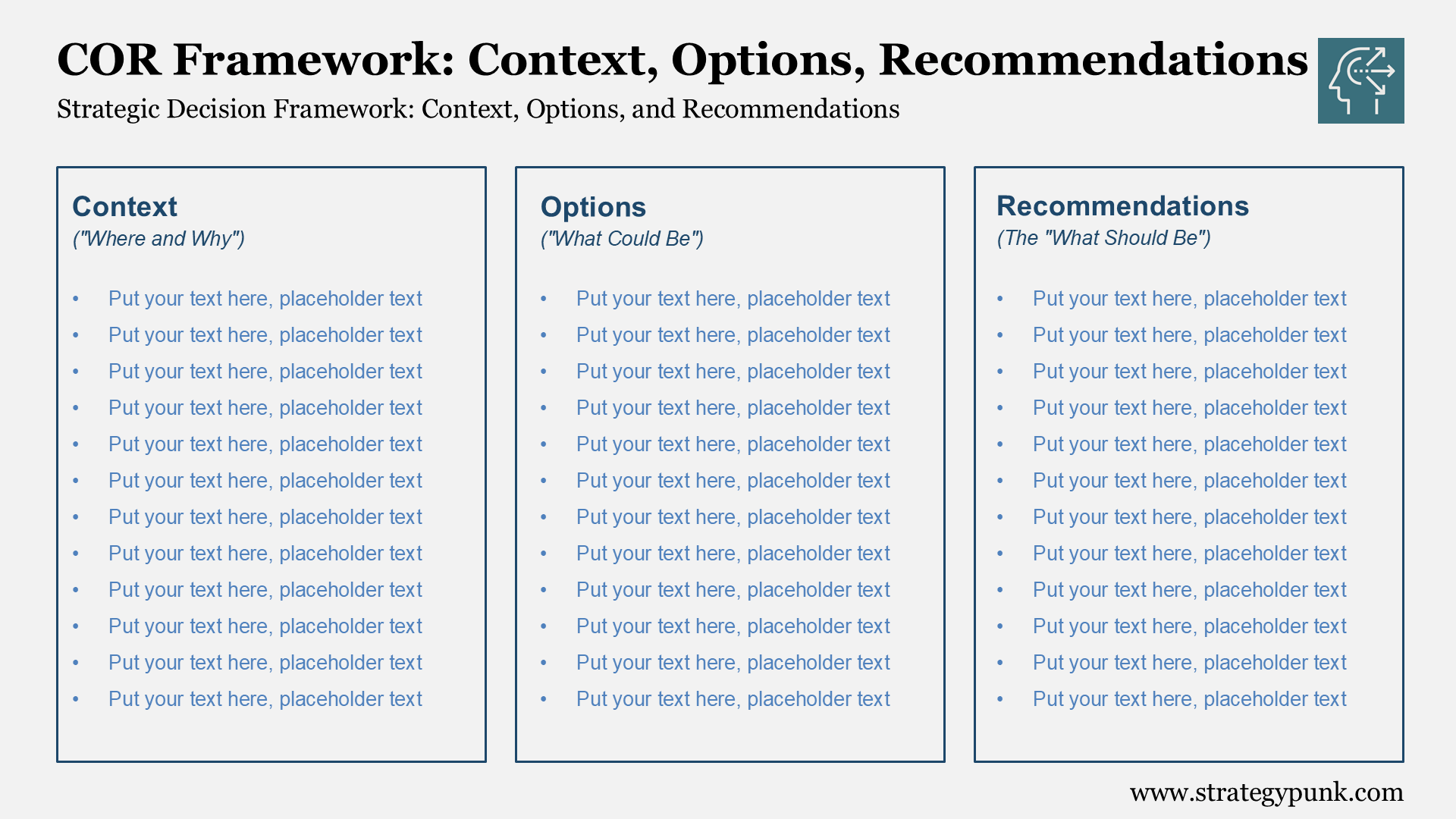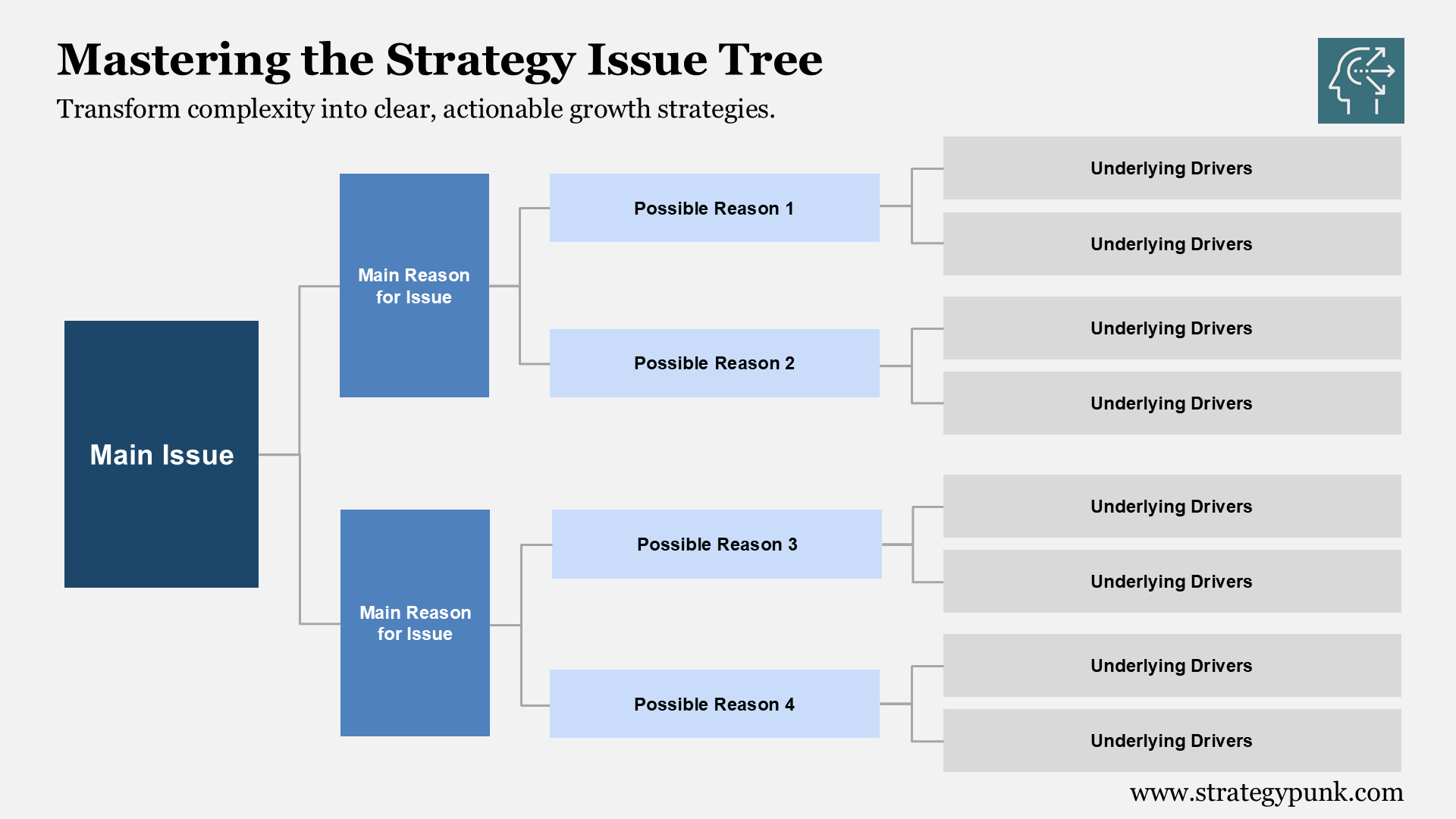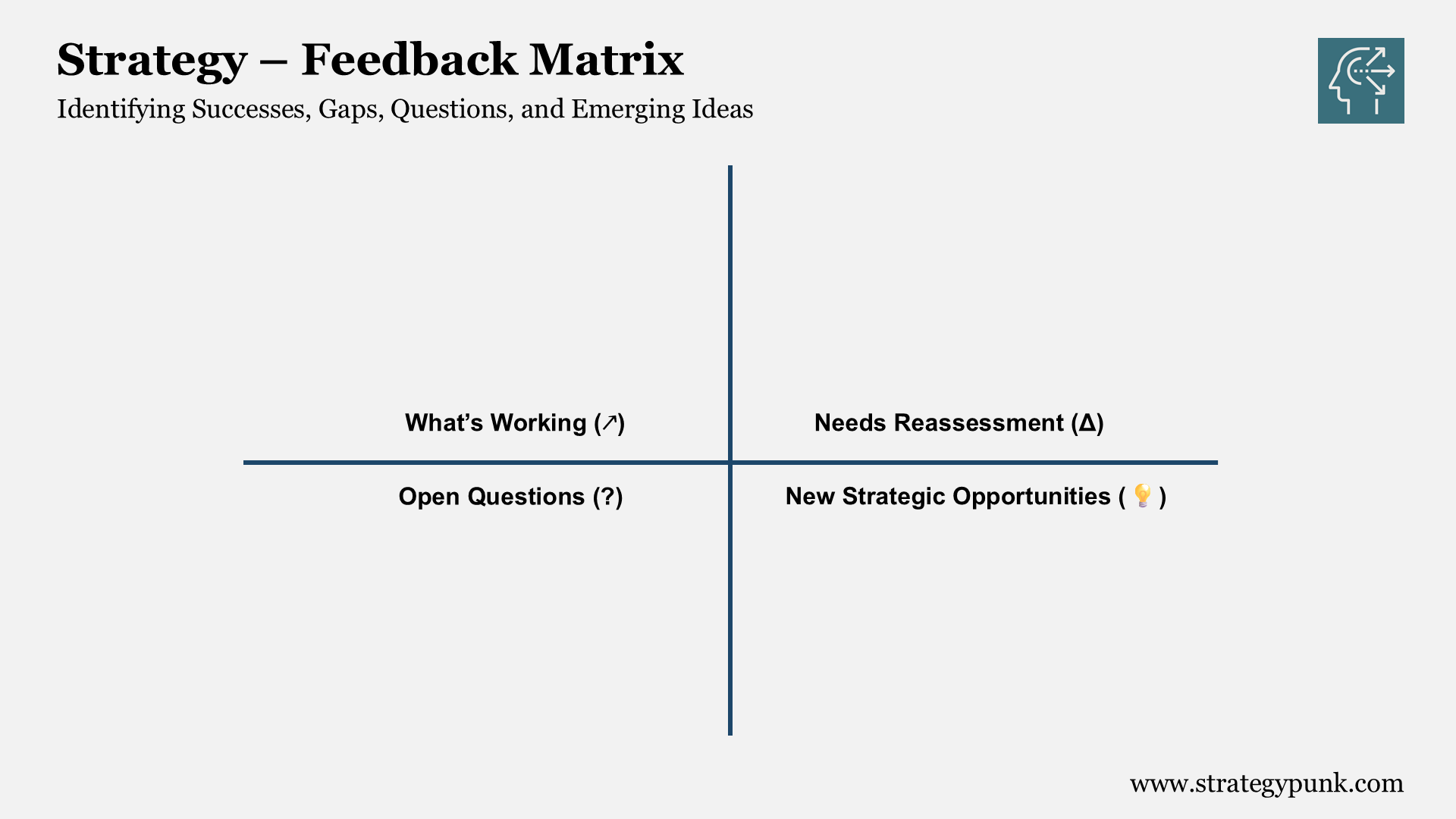Strategic Insights 2024: A SWOT Analysis of Samsung (Plus Free PPT)
Explore Samsung's strengths and opportunities with our free Strategic Insights 2024 PowerPoint template. Dive into the SWOT analysis now!

Introduction
In today's fast-paced and ever-evolving business landscape, staying ahead of the curve is crucial for any company's success. Samsung, a global powerhouse in the technology industry, is no exception.
As we enter 2024, it's essential to examine the company's strengths, weaknesses, opportunities, and threats (SWOT) strategically to understand its position in the market.
Introduction to Samsung
Samsung is a South Korean multinational conglomerate that operates across various industries, including electronics, semiconductors, telecommunications, and more. Founded in 1938, the company has become one of the world's largest technology companies, renowned for its innovative products and cutting-edge technologies.
A Brief Look at the History of Samsung
Samsung's journey began in 1938 when it was established as a small trading company in Taegu, South Korea.
Over the decades, the company diversified its operations, venturing into various industries such as electronics, construction, and shipbuilding.
However, in the late 1960s, Samsung made its mark in the electronics industry, launching its first black-and-white television.
What is the business model of Samsung?
Samsung's business model is centered around innovation, vertical integration, and a diverse product portfolio.
The company operates across multiple segments, including consumer electronics, semiconductors, display panels, and mobile devices.
Samsung's vertically integrated structure allows it to control the entire production process, from design to manufacturing, enabling cost efficiencies and faster time-to-market.
Financials of Samsung 2023
Samsung Electronics reported robust financials for 2023, underscoring resilience in a challenging market environment.
- Samsung Electronics reported a total annual revenue of KRW 258.94 trillion (approx. USD 199.19 billion) for 2023, highlighting significant fiscal performance amidst economic fluctuations.
- The fourth quarter alone saw a revenue of KRW 67.78 trillion (approx. USD 52.14 billion), driven by heightened demand for memory and premium display products.
- The Device Solutions (DS) Division faced operational challenges, posting operating losses of KRW 2.18 trillion (approx. USD 1.68 billion) in the same period, primarily due to pricing pressures and competitive dynamics in the semiconductor industry.
(Samsung News Hub)
In-depth SWOT Analysis of Samsung 2024
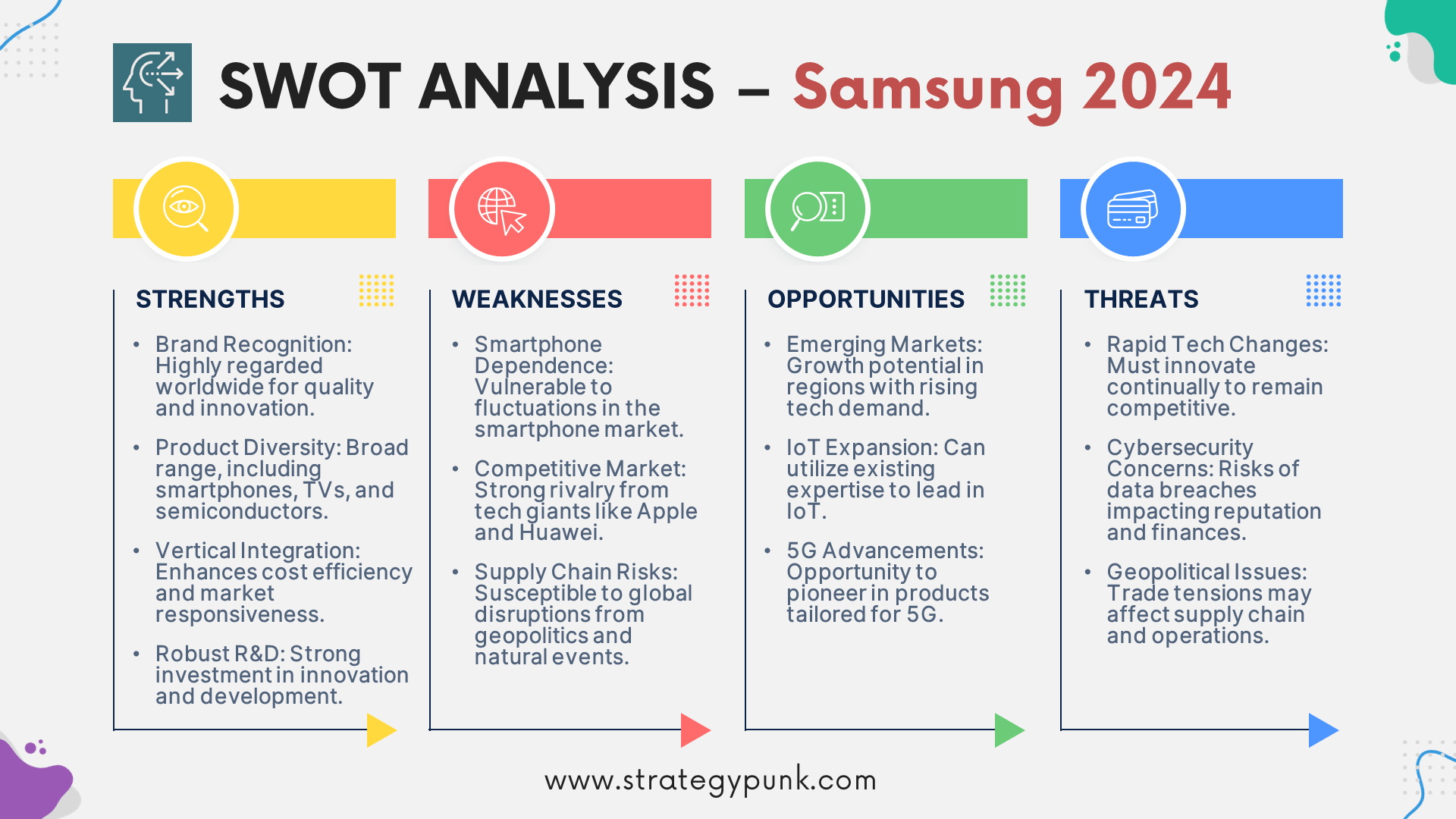
Samsung's Strengths
- Strong brand recognition: Samsung is a household name globally, known for its high-quality products and innovative technologies.
- Diverse product portfolio: The company offers various products, including smartphones, televisions, home appliances, and semiconductors, catering to different consumer segments.
- Vertical integration: Samsung's vertically integrated structure allows for cost efficiencies and faster time-to-market.
- Robust R&D capabilities: The company invests heavily in research and development, driving innovation and staying ahead of the competition.
Samsung's Weaknesses
- Dependence on smartphone sales: A significant portion of Samsung's revenue comes from its smartphone division, making it vulnerable to market fluctuations.
- Intense competition: Samsung faces stiff competition from other tech giants, such as Apple and Huawei, in the smartphone and consumer electronics markets.
- Supply chain challenges: Samsung's global supply chain Makes it susceptible to disruptions caused by geopolitical tensions, trade disputes, and natural disasters.
Samsung's Opportunities
- Expansion in emerging markets: With a growing middle class and increasing demand for technology products, emerging markets present significant growth opportunities for Samsung.
- Internet of Things (IoT): Samsung can leverage its consumer electronics and semiconductor expertise to capitalize on the rapidly growing IoT market.
- 5G technology: The rollout of 5G networks worldwide presents opportunities for Samsung to introduce new products and services tailored to this technology.
Samsung's Threats
- Rapid technological advancements: The technology industry constantly evolves, and Samsung must continuously innovate to stay relevant and competitive.
- Cybersecurity risks: As a technology company handling sensitive data, Samsung faces the threat of cyber-attacks and data breaches, which could damage its reputation and financial performance.
- Geopolitical tensions: Trade and political tensions between countries can disrupt Samsung's global supply chain and impact its operations.
Samsung SWOT Analysis Summary
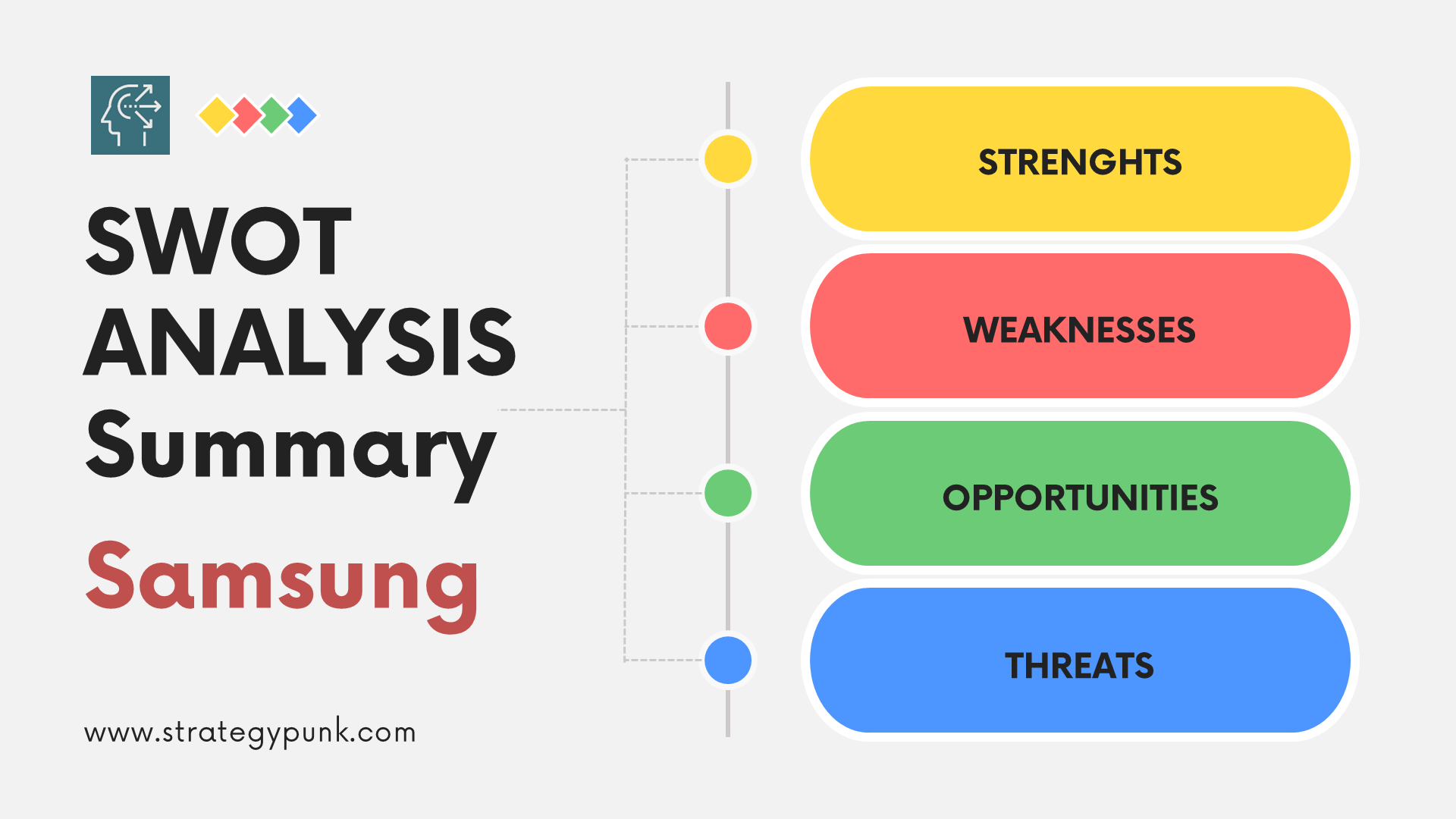
Internal Factors
Samsung's strengths lie in its strong brand recognition, diverse product portfolio, vertical integration, and robust R&D capabilities. However, the company's dependence on smartphone sales and intense competition in the tech industry pose significant weaknesses.
External Factors
Samsung's opportunities include expansion in emerging markets, the growing Internet of Things (IoT) market, and the rollout of 5G technology. Conversely, the company faces threats from rapid technological advancements, cybersecurity risks, and geopolitical tensions that could disrupt its global operations.
Samsung's Strategies for Success
based on Samsung SWOT Analysis
To maintain its competitive edge and capitalize on emerging opportunities, Samsung should focus on the following strategies:
Diversify revenue streams
While smartphones remain a crucial part of Samsung's business, the company should continue diversifying its product portfolio and exploring new revenue streams, such as IoT solutions and 5G-enabled devices.
Invest in emerging technologies.
Samsung should continue to invest heavily in research and development, focusing on emerging technologies like artificial intelligence, virtual reality, and advanced semiconductors.
Strengthen cybersecurity measures
With the increasing threat of cyber attacks, Samsung must prioritize robust cybersecurity measures to protect its data and maintain consumer trust.
Expand in emerging markets
Samsung should leverage its brand recognition and diverse product offerings to tap into the growing demand for technology products in emerging markets.
Foster strategic partnerships
Collaborating with other industry leaders and startups can help Samsung stay ahead of the curve and access new technologies and markets.
Frequently Asked Questions on Samsung
What is a SWOT analysis?
A SWOT analysis is a strategic planning tool to evaluate a company's strengths, weaknesses, opportunities, and threats. It comprehensively overviews internal and external factors impacting a business's performance and growth.
Why is a SWOT analysis important for Samsung?
Conducting a SWOT analysis is crucial for Samsung to identify its competitive advantages, address weaknesses, capitalize on emerging opportunities, and mitigate potential threats in the rapidly evolving technology industry.
How does Samsung's vertical integration contribute to its strengths?
Samsung's vertically integrated structure allows the company to control the entire production process, from design to manufacturing. This enables cost efficiencies, faster time-to-market, and better quality control.
What are some of the emerging opportunities for Samsung in the technology industry?
Some of Samsung's emerging opportunities include the growing Internet of Things (IoT) market, the rollout of 5G technology, and the increasing demand for technology products in emerging markets.
How can Samsung address the threat of cybersecurity risks?
To address the threat of cybersecurity risks, Samsung should prioritize robust cybersecurity measures, such as implementing advanced encryption techniques, conducting regular security audits, and providing comprehensive employee training on cybersecurity best practices.
Samsung SWOT Analysis PowerPoint Template
free and fully editable PPT template
A SWOT analysis evaluates the strengths, weaknesses, opportunities, and threats impacting a company.
This free editable PowerPoint template provides a SWOT analysis framework to evaluate Samsung's internal strengths and weaknesses and external opportunities and threats.
A free downloadable PowerPoint template summarizing Nestle's SWOT analysis is available at the link below:
Samsung SWOT Analysis PDF Template
Samsung SWOT Analysis PowerPoint Template
Feel free to customize the template by adding your content, images, and visuals.
Discover more
Samsung PESTLE Analysis: Unveiling the Driving Forces (Free PPT)
Download our comprehensive guide: Samsung PESTLE Analysis (Free PPT). Discover the strategic insights & driving forces shaping Samsung's future.

New! SWOT Framework & Free PPT Template - 2024 Edition
Dive into the 2024 Edition of our SWOT Analysis guide, complete with a free PowerPoint template. This resource covers the essentials of conducting a SWOT analysis, its benefits, and practical application tips, including a case study on Mercedes Benz.
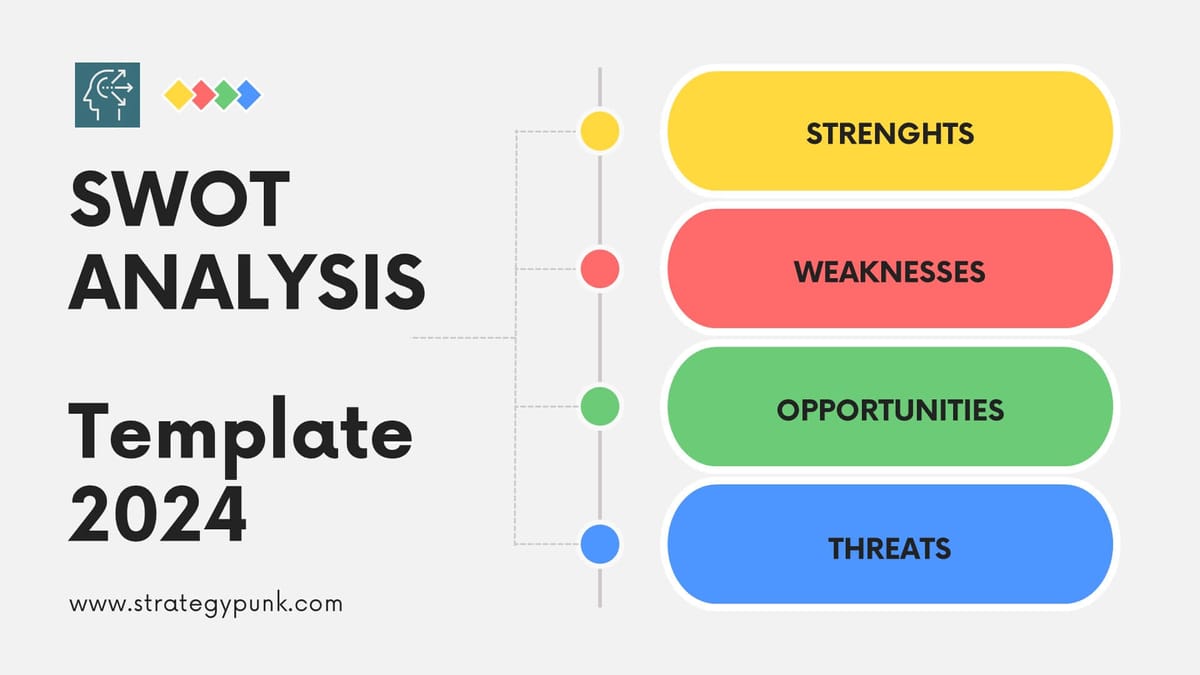
McKinsey Pyramid Principle: The Ultimate Guide to Effective Arguments
The McKinsey Pyramid Principle is pivotal in structuring arguments, making data understandable, and driving informed decisions in fast-paced business environments. This methodology uses a top-down approach to ensure concise, logical, and impactful presentations.
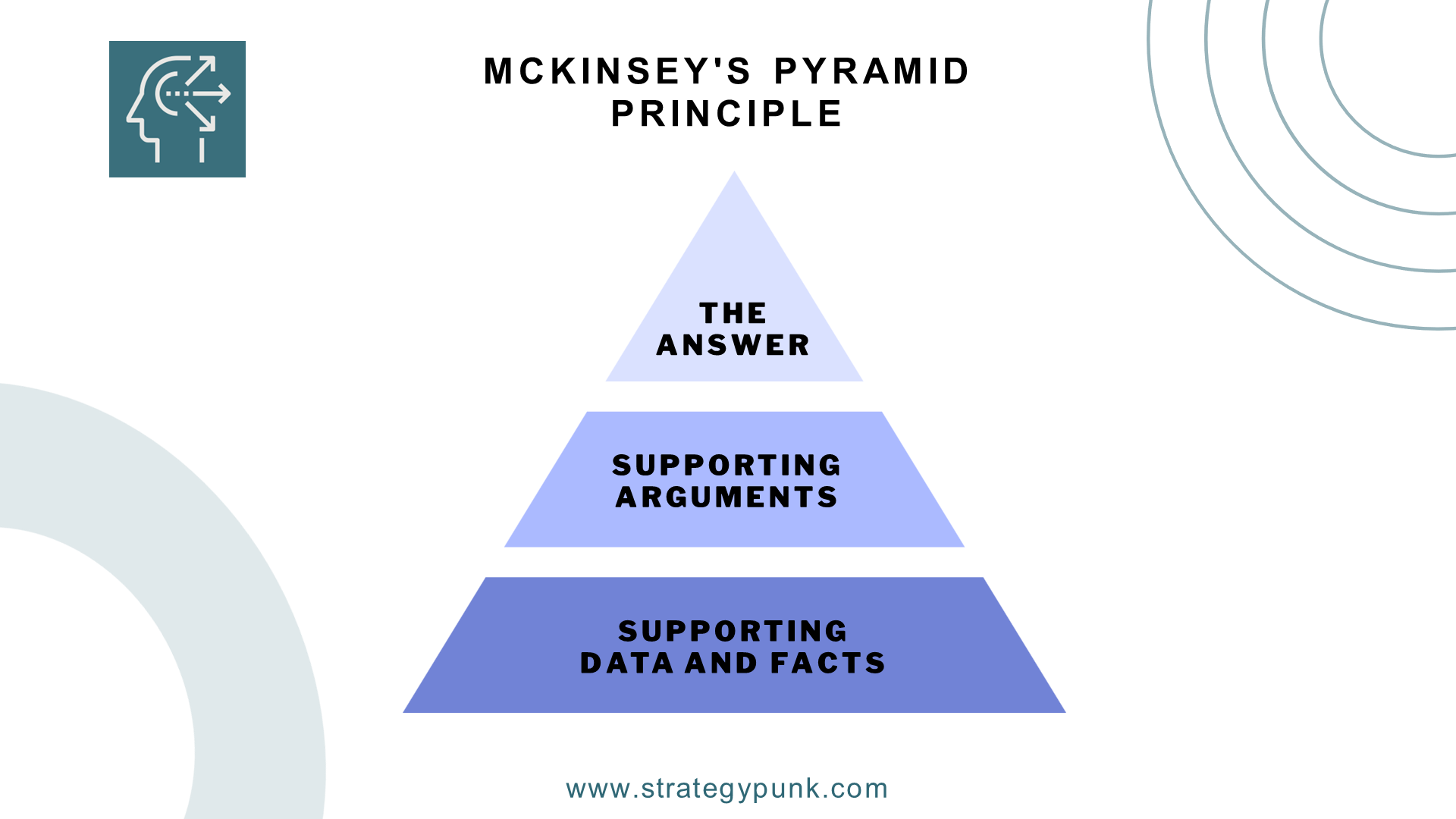
McKinsey's 3 Horizons Framework: Free PowerPoint Template
How do you think about growth and innovation? Focus on the Now, New, and Next. Free slide deck in PowerPoint and Google Slides format.
